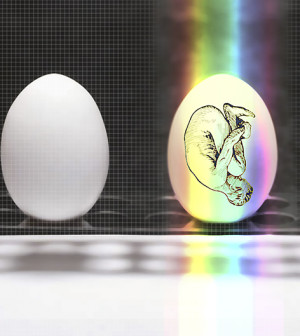- 10 Strategies to Overcome Insomnia
- Could Artificial Sweeteners Be Aging the Brain Faster?
- Techniques for Soothing Your Nervous System
- Does the Water in Your House Smell Funny? Here’s Why
- Can a Daily Dose of Apple Cider Vinegar Actually Aid Weight Loss?
- 6 Health Beverages That Can Actually Spike Your Blood Sugar
- Treatment Options for Social Anxiety Disorder
- Understanding the Connection Between Anxiety and Depression
- How Daily Prunes Can Influence Cholesterol and Inflammation
- When to Take B12 for Better Absorption and Energy
Good Results From IVF Egg Donors Over Age 35

Results of in vitro fertilization (IVF) cycles using eggs from older donors are as good as those using eggs from younger women, a new study finds.
Because egg quality declines with age, most IVF centers only accept eggs from donors younger than 35, says Resolve, the National Infertility Association, based in McLean, Va.
But Canadian researchers found that pregnancy and live birth rates from IVF cycles using eggs donated by women over 35 were comparable to those using eggs from women younger than 35.
Relaxing donor age restrictions could make more eggs available to infertile couples, especially in countries like Canada, which prohibits payments to egg donors, experts say.
“Extending the limit of acceptable donor age could make the process easier for Canadian patients with friends or family over 35 who want to donate eggs to them, and also expand the pool of altruistic donors who want to help patients unknown to them,” said Dr. Rebecca Sokol, president of the American Society for Reproductive Medicine.
“In the United States, a greater willingness to work with older donors could also help patients who prefer to work with a relative or friend as donor,” Sokol said in an association news release.
The study, conducted by Dr. Tal Shavit and colleagues at McGill University in Montreal, looked at more than 400 IVF cycles done with donor eggs — 345 from women younger than 35 and 83 from donors older than 35.
The older donors were given higher doses of hormonal drugs and produced fewer egg cells. The researchers found, however, that pregnancy and live birth rates involving the older egg donors were not significantly different from those using eggs from younger women.
The study’s findings were scheduled for presentation Tuesday at the annual meeting of the American Society for Reproductive Medicine in Baltimore. The research was also published online simultaneously in the journal Fertility and Sterility.
More information
The U.S. Centers for Disease Control and Prevention provides more information on assisted reproductive technology.
Source: HealthDay
Copyright © 2026 HealthDay. All rights reserved.










